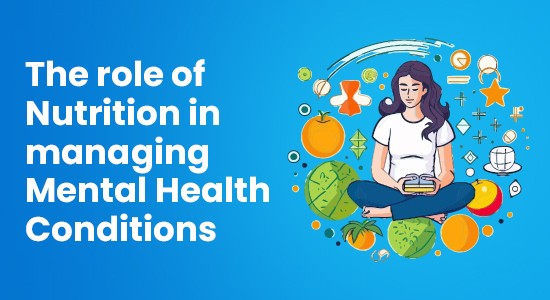In an era increasingly attuned to the complexities of mental well-being, the conversation around mental health has broadened significantly, moving beyond traditional psychological approaches to embrace a more holistic understanding. Among the various factors now recognized as profoundly influential, the role of nutrition has emerged as a compelling and increasingly undeniable cornerstone. Our brains, remarkably intricate organs, are constantly active, demanding a consistent supply of nutrients to function optimally. Far from being merely fuel for physical activity, the food we consume directly impacts brain structure, neurotransmitter production, inflammation, and overall cognitive function, thereby exerting a powerful influence on our mood, energy levels, focus, and susceptibility to mental health conditions. Understanding this intricate connection between diet and mental well-being is not just beneficial; it’s a transformative insight that empowers individuals to nourish their minds as consciously as they nourish their bodies.
The foundational principle linking nutrition to mental health lies in the brain’s profound metabolic demands. Despite accounting for only about two percent of body weight, the brain consumes a disproportionate amount of the body’s energy and nutrient resources. It requires a steady supply of glucose, healthy fats, amino acids, vitamins, and minerals to synthesize neurotransmitters—the chemical messengers that regulate mood, sleep, appetite, and thought processes. For instance, serotonin, often dubbed the “feel-good” neurotransmitter, is largely produced in the gut, a process heavily reliant on the availability of specific amino acids (like tryptophan) and B vitamins, all derived from diet. When the brain is deprived of these essential building blocks, or when its energy supply is erratic, its ability to function optimally is compromised, potentially leading to symptoms of anxiety, depression, irritability, and poor concentration.
One of the most significant areas of research highlighting the nutrition-mental health connection focuses on the gut-brain axis. The gut is often referred to as the “second brain” due to its extensive network of neurons and its bidirectional communication with the central nervous system. A healthy gut microbiome, teeming with diverse beneficial bacteria, plays a crucial role in producing neurotransmitters, modulating inflammation, and influencing stress responses. Diets high in processed foods, sugar, and unhealthy fats can disrupt this delicate microbial balance, leading to dysbiosis (an imbalance of gut bacteria) and increased gut permeability. This can trigger systemic inflammation and impact brain function, potentially contributing to mood disorders. Conversely, a diet rich in fiber, fermented foods, and diverse plant-based options supports a thriving gut microbiome, fostering a healthier gut-brain connection and promoting mental resilience. Imagine the analogy of a garden: just as a vibrant garden needs rich soil and diverse plants, a healthy brain thrives on a well-nourished gut environment.
Furthermore, specific micronutrients are indispensable for neurological health. Omega-3 fatty acids, particularly EPA and DHA, are crucial structural components of brain cell membranes and possess potent anti-inflammatory properties. Research consistently links adequate omega-3 intake with a reduced risk of depression, anxiety, and even cognitive decline. B vitamins (B6, B9, B12) are vital for the synthesis of neurotransmitters, and deficiencies can lead to fatigue, irritability, and mood disturbances. Magnesium, a mineral involved in over 300 biochemical reactions in the body, is known for its calming effects on the nervous system, and its deficiency is often seen in individuals experiencing anxiety. Zinc, iron, and Vitamin D also play critical roles in various brain functions, and their deficiencies can similarly manifest as mental health challenges. This intricate interplay underscores why a broad spectrum of nutrients, derived from a diverse diet, is so critical.
The impact of dietary choices is also evident in the body’s inflammatory response. Chronic, low-grade inflammation, often fueled by diets high in refined sugars, trans fats, and processed foods, has been increasingly implicated in the development and persistence of various mental health conditions, including depression. Conversely, anti-inflammatory foods—such as fruits, vegetables, whole grains, nuts, seeds, and fatty fish—can help regulate inflammation, thereby creating a more favorable environment for brain health. This is why a shift towards a “Mediterranean-style” diet, characterized by its emphasis on whole, unprocessed foods, healthy fats, and plant-based proteins, is consistently associated with better mental health outcomes.
While nutrition is not a standalone cure for complex mental health disorders, it serves as a powerful foundational support, enhancing the effectiveness of other treatments and promoting overall well-being. Incorporating balanced meals rich in whole foods, healthy fats, lean proteins, and a wide array of fruits and vegetables can significantly improve mood stability, cognitive clarity, and emotional resilience. This often means reducing the consumption of highly processed foods, sugary drinks, and excessive caffeine, which can lead to energy crashes and exacerbate anxiety. Ultimately, recognizing the profound and intricate role of nutrition in mental health empowers individuals to make informed dietary choices, fostering a deeper connection between what we eat and how we feel, thereby nurturing both mind and body for a more balanced and vibrant life.





